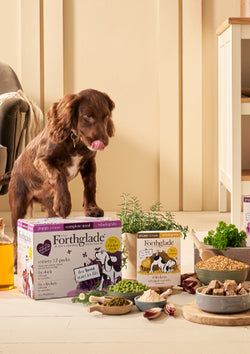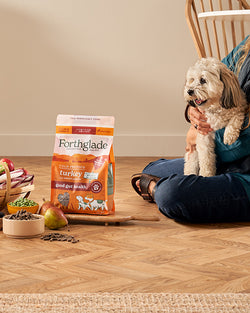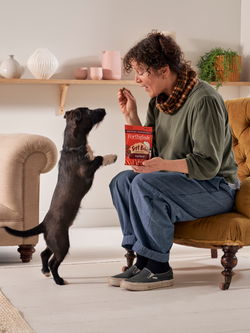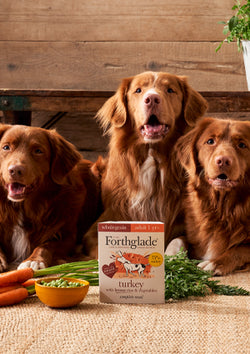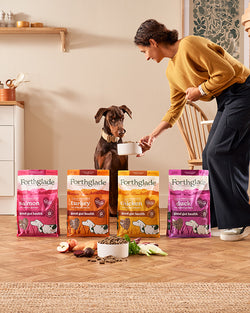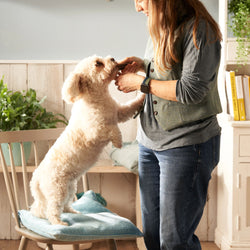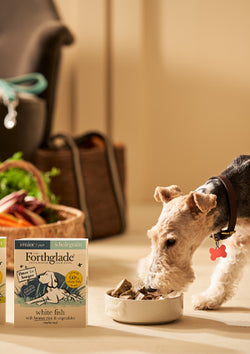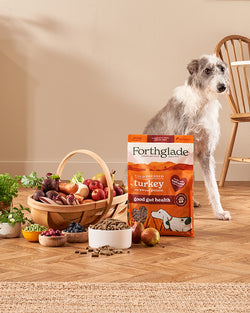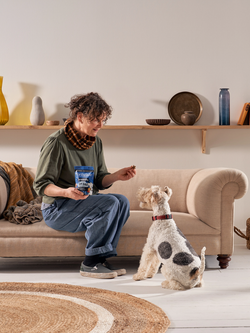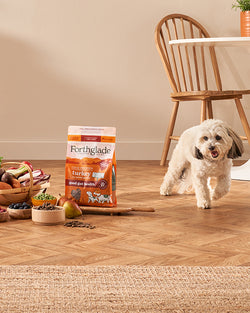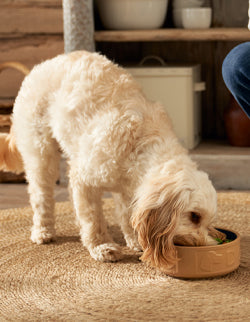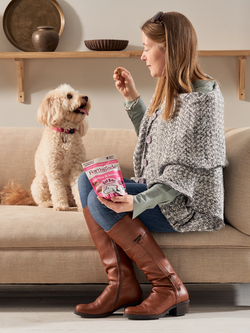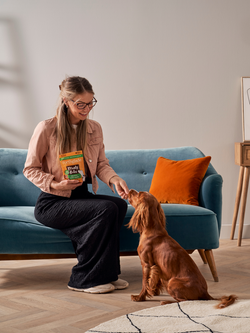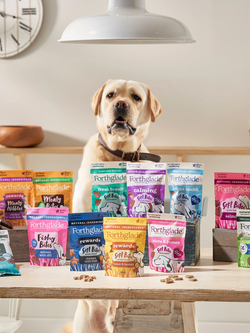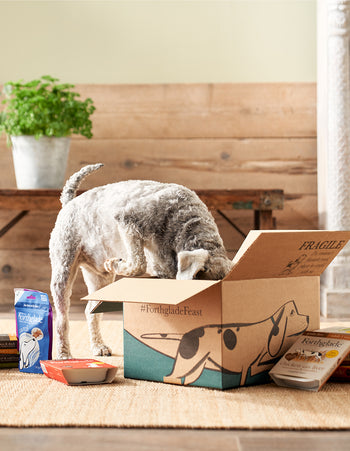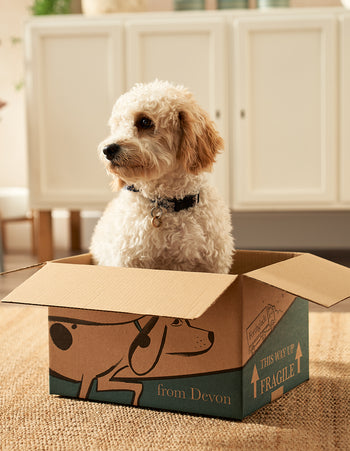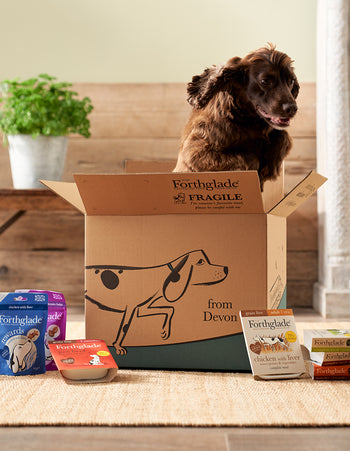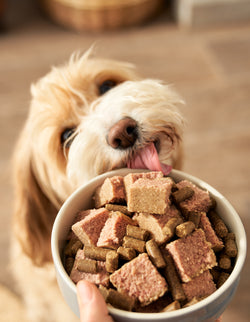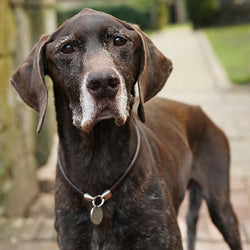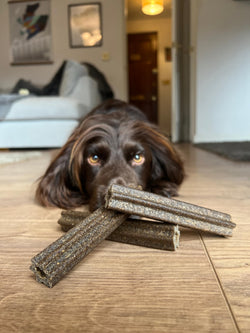Let’s be honest, no one expects their dog’s breath to smell minty fresh, but if your pup’s kisses are getting a little too stinky, it might be time to take action. Dog bad breath is a common problem, but it’s not something you have to put up with.
In this guide, we’ll explain the most common causes of smelly dog breath and give you 7 easy, natural tips for how to get rid of it fast.

Why does my dog’s breath smell so bad?
Just like with humans, there are lots of reasons why your dog might have bad breath, from poor dental hygiene to underlying health issues. Understanding the cause is the first step in fixing the stink.
Incorrect diet
Feeding your dog sugary snacks or human food can upset their stomach and lead to unpleasant breath. Check out of blog on Can dogs eat human food? A poor-quality diet can also contribute to inflammation in the gut or mouth, these are two key sources of odour.
Dental issues
The most common culprit behind bad breath in dogs is dental disease. Plaque, tartar, and gum disease can all lead to bacteria buildup in your dog’s mouth, creating a foul smell.
Eating something toxic
In some cases, bad dog breath could mean your pup has eaten something they shouldn’t, like a household toxin, spoiled food, or even poisonous plants. If you suspect this, contact your vet straight away.
Eating something gross
Dogs love to explore the world with their mouths and unfortunately, that can include eating faeces, garbage, or dead animals. Learn more on Why do dogs eat poop? These unsavoury habits can quickly cause breath that makes you turn your head.
Something stuck in their mouth
Sometimes, a piece of food, stick, or even a bit of fur can get wedged between teeth or stuck in the gums, starting to decay and smell.
Liver disease
If your dog’s breath smells particularly foul or metallic, it could be a sign of liver disease. This usually comes with other symptoms like vomiting, lack of appetite, or yellow gums.
Diabetes
A sweet or fruity smell on your dog’s breath could actually be a warning sign of diabetes, especially if they’re drinking more water or needing to wee more often.
Oral tumors
While rarer, oral tumours can cause tissue to die in the mouth, leading to an ongoing smell. If your dog has persistent bad breath that doesn’t improve, it's worth having their mouth examined by a vet.

How to get rid of smelly dog breath
Now we know the causes, let’s look at what you can do to help your pup’s breath smell fresher. Here are 7 effective tips to try at home.
1. Regular brushing
Brushing your dog’s teeth might sound like a big job, but it’s one of the most effective ways to prevent bad breath. Aim for a few times a week using dog-safe toothpaste and a soft brush. Start slow and reward with treats to help them get used to it.
2. Dental treats and chews
Chewing helps reduce plaque and freshen breath, especially when using vet-approved treats designed with oral health in mind. Try our dog dental sticks for a plant-based option that supports clean teeth and fresh breath. You can also reward them with dog fresh breath treats between brushes for a tasty boost.
3. Feed a high-quality diet
What your dog eats can have a huge impact on their oral health and immune system. A natural, well-balanced diet helps keep their mouth and gut in good shape, reducing inflammation and odour. Explore our full range of natural dog food or consider sensitive stomach dog food if you suspect their breath is linked to tummy issues.
4. Provide safe chew toys
Chewing is a natural behaviour that helps scrape away plaque. Choose durable, vet-approved chew toys that encourage healthy habits while protecting teeth and gums.
5. Fresh water every day
Make sure your dog always has access to clean, fresh water. Hydration helps flush bacteria from the mouth and keeps saliva flowing, which is key to a clean mouth.
6. Schedule regular vet check-ups
Your vet can spot signs of dental issues long before you can. Annual check-ups (and dental cleanings if needed) can help prevent minor plaque from turning into painful infections.
7. Watch for changes in behaviour
If your dog suddenly develops bad breath, especially if it’s sweet, sour, or metallic, it could signal an underlying health issue. Keep an eye on changes in appetite, weight, or energy, and speak to your vet if you notice anything unusual.

Conclusion
Smelly dog breath isn’t something you have to live with. In most cases, it’s easily managed with better oral hygiene, a nutritious diet, and the occasional dog dental stick or dog fresh breath treat.
Supporting your pup’s wellbeing inside and out is at the heart of what we do at Forthglade and fresher breath is just the beginning.
Curious about how your dog’s food is made? Keep reading with: What is cold-pressed dog food?






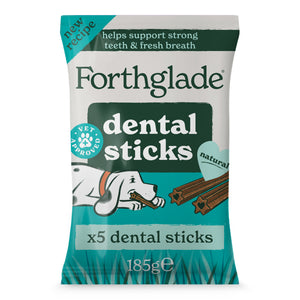

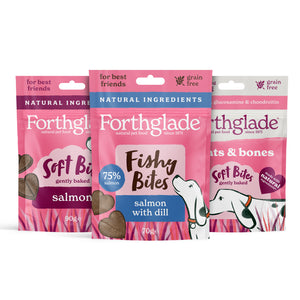



 FAST & FREE DELIVERY ON ORDERS £40+*
FAST & FREE DELIVERY ON ORDERS £40+*
 SUBSCRIBE TO SAVE 10% OFF EVERY ORDER
SUBSCRIBE TO SAVE 10% OFF EVERY ORDER
 OVER 13,600 5 STAR REVIEWS
OVER 13,600 5 STAR REVIEWS


